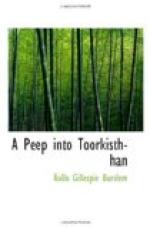would be covered for a distance of many feet with
a smooth coat of ice, and then it was indeed dangerous.
After moving on in this way for some minutes, the road
gradually widened till we found ourselves on the damp
and dripping flooring of a chamber of unknown dimensions;
the torch light was not strong enough to enable us
to conceive the size of this subterraneous hall, but
all around us lay scattered melancholy proofs that
there was some sad foundation for the moollah’s
story. Hundreds of human skeletons were strewed
around; as far as the eye could penetrate these mournful
relics presented themselves; they were very perfect,
and had evidently not been disturbed since death;
some had more the appearance of the shrivelled-up
remains which we find in the Morgue on the road to
the Grand St. Bernard, and lay about us in all the
varied positions induced by their miserable fate.
Here, it seemed that a group had, while sufficient
strength yet remained, huddled themselves together,
as if to keep up the vital warmth of which death so
slowly and yet so surely was depriving them; a little
farther on was a figure in a sitting posture, with
two infants still clasped in its bony arms; and then
again the eye would fall upon some solitary figure
with outstretched limbs, as if courting that death
which on the instant responded to the call. Involuntarily
my thoughts recurred to Dante’s beautiful description
of the Comte Ugolino’s children and their piteous
end in the Torre della Fame—but here, a
sickening sense of the dreadful reality of the horrors,
which it was evident from these mute memorials of
man’s cruelty to his fellow had been endured,
quite oppressed me, and I wished I had never visited
the spot. I felt myself so much harrowed by this
sad scene, that I endeavoured to distract my attention;
but what was my astonishment when my eye fell upon
the print of a human naked foot, and beside it the
distinct mark of the pointed heel of the Affgh[=a]n
boot!—I hope my reader will give me credit
for truth—I can assure him that it was some
time before I could believe my own eyes, though I
considered that the result of our explorations would
explain in part the sight, which appeared to me so
extraordinary, and which tallied so strangely with
the footprints which had frightened Shah Pursund Khan
twelve years ago. I was still absorbed in reflections
of no very gay colour, when one of the attendants
warned me that if I staid all day amongst the “dead
people,” there would not be sufficient oil to
feed the torches, and we should be unable to visit
the Ice Caves. I was immediately roused, and
proceeded onwards with the party through several low
arches and smaller caves,—suddenly a strange
glare spread itself about me, and after a few more
steps a magnificent spectacle presented itself.
[Illustration: Drawn by Mr Gempertz Pelham Richardson Litho
View of the Ice Caves in the Cavern of Yeermallik.]




